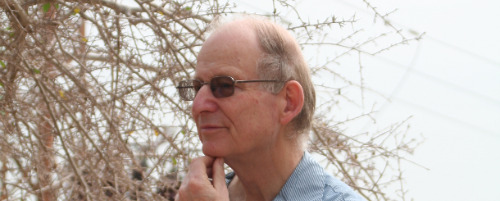An Israeli scientist’s discovery of TRP channels is making waves worldwide, since these proteins are involved in vision; initiating the sensation of pain, temperature and taste; and even in hereditary neurological diseases.

The first time Prof. Baruch Minke saw a Drosophila fruit fly, he was crushed. He never dreamed that the insect would help him to discover the causes and mechanisms by which pain is produced and perceived, and lead to his winning prestigious awards – most recently, the 2010 Prince of Asturias Award for Technical and Scientific Research and the 2010 EMET Prize for brain research.
Back in 1975, he had no inkling of the fly’s importance to his work.
A series of mishaps had led Minke to use his Fulbright Scholarship at Purdue University in Indiana rather than at Johns Hopkins University in Maryland. He had anticipated working at Hopkins to build upon his Hebrew University graduate studies on vision. That research, using the crustaceans called barnacles, had revealed key differences in the way light is absorbed in the eyes of invertebrates and humans.
“In our eyes, the molecules that absorb light are composed of protein and a substance related to vitamin A,” he explains to ISRAEL21c at his Hebrew University-Hadassah Medical School laboratory. “Each molecule is used only once before it decomposes into its two components. But in invertebrates, the same molecule can be used again and again. It’s much more efficient.”
The Hopkins study was to provide him with instrumentation to more accurately measure this phenomenon, but its funding fell through and Minke found himself confronting fruit flies at Purdue instead. “I was very depressed,” he recalls. “How could I work on that? Would the principle I found in barnacle molecules hold true in the Drosophila?” To his surprise, it would.
Fruit flies lead to revolutionary discovery
Although Drosophila had long been the leading organism used for studying genetics, Purdue was only one of three academic centers in the world using mutant fruit flies to uncover the biochemical pathways behind vision and visually guided behavior.
“When I found that the barnacle phenomenon works in flies, it revolutionized the field because it helped us find the interesting mutants,” says Minke.
Fifteen years of researching a mutant fly originally found in Scotland led to Minke’s discovery of light-activated proteins he dubbed transient receptor potential (TRP) ion channels. TRP became a whole new subfield of biological research.
Today, the work of Minke and several other scientists is making waves worldwide. They have revealed that TRP channels govern many of the human body’s regulatory processes. These proteins are involved not only in vision but also in initiating the sensation of pain, temperature, and taste, and even in hereditary neurological diseases.
Blocking pain without aspirin or morphine
The pain connection has caused the biggest stir, as major pharmaceutical companies work to develop new pain-relief drugs targeting TRP channels.
“Until now, there was no molecular biology in the field of pain relief,” Minke relates. “All the current pain relievers are based on non-specific drugs discovered in the 19th century, such as morphine and aspirin.” Now the goal is to block the sensation of several types of pain by inhibiting TRP channels.
This groundbreaking approach has not yet yielded a perfect solution, because the same TRP molecules ‘report’ both pain and temperature to the brain. “Once you inhibit the molecule, it causes severe hypothermia. We need to find a way to bypass that side effect,” Minke explains.
There is much more to learn about TRP, which is why Minke and his team of about 15 international doctoral students – Israelis and natives of France, Germany, New York and Colombia – keep plugging away with their bottles of fruit flies. The lab has been funded for the past 30 years by a renewable grant from the US National Institutes for Health, and by several other bi-national and German grants.
From farm chores to science
Minke had little interest in science until adulthood. Born on a kibbutz in 1940 to parents who had fled Poland, he grew up tending cows, vegetables and fruit trees. His family moved to a cooperative farm when he was 12, and Minke had to rise at four each morning to do chores before school. When he returned, there were more farm duties before he could finish his homework and escape to bed with a book.
Minke’s unconventional education culminated in a Galilee agricultural boarding school that also produced Israeli leaders such as Prime Minister Yitzhak Rabin. Due to its free-flowing curriculum – each teacher taught what he or she wished – the diploma was not recognized by any institution of higher learning. Following completion of correspondence courses years later, he started out studying philosophy and sociology at the Hebrew University, but soon switched to the natural sciences.
Minke has been offered positions in the United States and Australia, but he prefers to stay in Israel. “It is only here I feel at home,” he explains simply.
He and his wife Rachel have two daughters – one in computers and the other a veterinarian – and two grandchildren. Though Minke swims every morning and walks every evening, he professes to have no interests beyond his science.
“This is my life,” he asserts. “I am thinking about my papers and experiments while I swim, while I hike, and even when I dream at night.”













